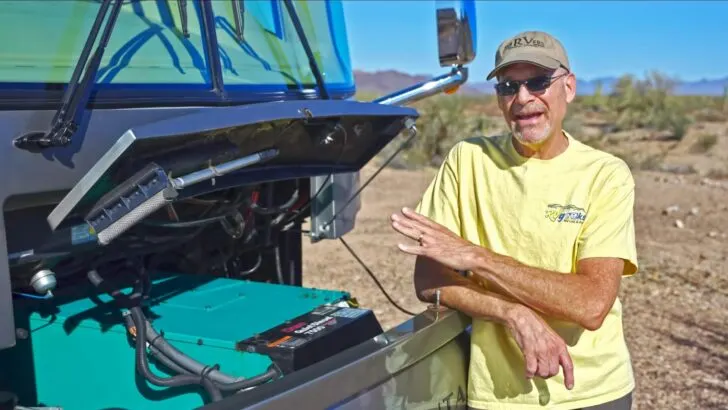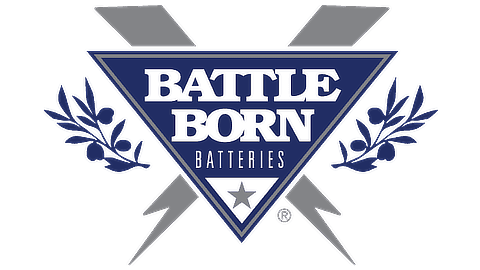Can you run an RV air conditioner while driving your rig down the road? That’s a good question, especially with the summer camping season right around the corner. Spoiler alert, the answer is “Yes, but…”
In this post, we’ll share everything you need to know about running your RV’s air conditioner(s) while you’re traveling. We’ll provide the safety information you need, and tell you how you can keep your rig cool as you drive during the heat of the summer.
Can You Run An RV Air Conditioner While Driving?
In motorized RVs, the dash air conditioner is often unable to keep the whole RV cool on very hot days. So, if you’ve got pets or other passengers who need to be kept comfortable as you travel, or if you just want to cool your RV down before arriving at your campsite, you may wonder if you can run the house AC while driving.
While you can run an RV rooftop air conditioner while driving, there are a couple of things to consider before attempting to keep your RV cool by running an AC unit (or two) as you drive.
Power Source
The main thing you’ll need to consider is how you’ll power your RV’s air conditioner as you’re driving.
RV air conditioners typically require 120V AC power from one of three sources: 1) Shore power from an external source such as an RV park power pedestal, 2) A diesel- or gasoline-powered generator, or 3) An inverter connected to, and powered by, the RV’s house battery bank.
Since most RVs lack the battery capacity to run the roof A/C, and most shore power cords aren’t long enough to stay connected while driving 😉, you’ll most likely need to rely on the RV’s generator to power the RV’s air conditioner while driving.

You can use your RV’s generator to run your rig’s air conditioner(s) as you travel, but it’s best if it’s a built-in model like this Onan in our Newmar Mountain Aire.
Battery Bank and Inverter
If you have a large enough battery bank & inverter (and your RV is wired to allow it), you can power your RV’s air conditioner off the house battery bank.
With sunny conditions and a large enough solar array on the roof, along with any charging provided to the batteries from the RV’s or towing vehicle’s alternator, you may not even deplete the battery bank’s charge too much, depending on how long you need to run it.
Keep in mind that running something as power-hungry as even a single A/C unit requires a fairly large battery bank. In turn, that requires a substantial solar array to keep those batteries charged. The type of battery is also more important than ever. For an RV that’s set up to handle the demands of running the air conditioning off battery power, lithium (LiFePO4) batteries are the best bet by far.
If you’re looking for top-quality batteries, solar systems, and/or inverters, be sure to save some $ by using our RVgeeks coupons:
Battle Born — Batteries, Solar & Inverters:
Xantrex — Lithium Batteries:
We've got long-term experience with Xantrex products (our first motorhome came with a Xantrex Freedom 458 Inverter/Charger), and have always had a good experience with them. In our Mountain Aire...Show More
We've got long-term experience with Xantrex products (our first motorhome came with a Xantrex Freedom 458 Inverter/Charger), and have always had a good experience with them. In our Mountain Aire we've enjoyed many years of boondocking freedom thanks to our Xantrex lithium battery, solar panels & charge controllers, and pure-sine inverter/charger.
Now, you can save 5% by ordering direct from Xantrex's online store when you use the Promo Code "RVGEEKS"
Watch our video about installing our Xantrex lithium battery
Choose from several Xantrex lithium batteries, accessories, and more (to come!). Shipping to both the US and Canada available!
Show LessUsing a Generator While Driving
Running a generator while driving is possible, but it’s important to make sure it’s done safely. Some RVs have built-in generators, while others may require a portable generator to be set up.
If your RV has a built-in generator like those installed in a motorhome or larger fifth-wheel, you should be able to run the generator as you drive without issue. We’ve run the generator in our diesel pusher many times while driving, either to run the roof A/C in very hot weather or to charge our house batteries faster between boondocking spots.
Note that if your generator is large enough, you can even run more than one air conditioner if your rig has multiple units. Just be sure that any other 120V AC loads such as your refrigerator, battery charger, etc. won’t overload the generator.
If you have a portable generator, we wouldn’t recommend running it while you drive unless you can meet some very specific requirements:
1.) First, the generator needs to be safely and securely mounted so that it won’t come loose as you drive and so that its exhaust won’t cause an issue. Remember that the heat of the exhaust could melt something nearby (think pickup truck bedliner or a plastic storage container). Carbon monoxide from a gasoline generator can also be a safety issue in the RV or even in the towing vehicle.
2.) You also have to be able to safely route the RV’s power cord to the generator, without risking it getting caught or damaged. We think that’s the biggest risk of using a portable gas generator while driving.
It may be easy to secure the unit in the bed of the truck, but most RVs have their shore power cord located somewhat far back. Make sure that the long run of cord from the RV to the generator is well secured along its entire length. The last thing you want to happen is the cord catching under your trailer’s tire and getting yanked violently out of the RV and/or the generator.
If you’re wondering if you can run an air conditioner on solar power, check out our post on that very topic. Keep in mind that solar doesn’t actually provide power to anything other than the battery charger. It’s the batteries that power everything else.
Manufacturer’s Guidelines
Before running your rig’s air conditioner(s) while driving, consult your RV’s manual for any specific considerations. There should be no problem. But as always, the manufacturer’s guidelines and requirements are the final word.
The question of whether or not you can run your RV’s air conditioner while driving the rig down the road is a common one. For the answers to similar questions, see our posts entitled, “Is It Safe to Run My RV Refrigerator On Propane While Driving?” and “Can You Ride In a Travel Trailer (or ANY Towable) When Driving?”
Free RVing Tips, Tricks, Reviews & Giveaways
As 20-year full-timers, we share everything we’ve learned about RVing over the years. Join our online community to receive a wealth of great RVing knowledge delivered daily to your inbox.
Whether you’re a new RVer or a seasoned full-timer, you’ll love the wide range of RVing topics we cover. Don’t miss a single article or any of our famous Giveaways. Subscribe to our newsletter today!




Jeff
Monday 11th of March 2024
I love your insight on these different items in the RV world. On another note. We have a 2022 Berkshire motor home. Would a soft start device be beneficial for newer air conditioning units? Thank you, Jeff
TheRVgeeks
Monday 11th of March 2024
Hi Jeff. Yes... a soft start can be beneficial on any air conditioner, new OR old. Reducing that start up current surge is helpful for your RV's whole electrical system, allowing you to keep running more than you otherwise would on lower-amperage connections (like a 30-amp pedestal) than you could have otherwise. We love our Micro-Air EasyStarts... designed, engineered, and made in America (with US-based support, too)! Use the Discount Code "RVGEEKS" at checkout to save $25, too!
RichardM
Sunday 10th of March 2024
We run our diesel generator all the time while driving. The dash air is non-functional (seized compressor according to the shop).
Kevin
Sunday 10th of March 2024
Another safety concern is to make sure your Generator is not running while refueling the RV coach at a fuel stop.
Also make sure your refrigerator is off as well, if you have a refrigerator that switches to Propane Automatically when Shore Power is disconnected, no open flames while refueling.
A cute Limerick that my Grandfather told me as a lad goes like this:,
“ There once was a man who used a Match to check his tank,
And now they call him Skinless Frank.”
Ocala, FL
Gay Travel Enthusiast (Jason)
Sunday 10th of March 2024
That makes no sense. What good does having an A/C unit in your vehicle if you can't use it while you drive? The only time I use the A/C in my car is when it's 80+ degrees, and only if the windows are rolled down. Generally if it's 80 degrees outside, it's warmer than that inside the car, probably 90 degrees or hotter. If it's uncomfortable for you, OMG! Your pets if you have any, will be miserable!
Jerry
Friday 22nd of March 2024
@Gay Travel Enthusiast (Jason), Huh?